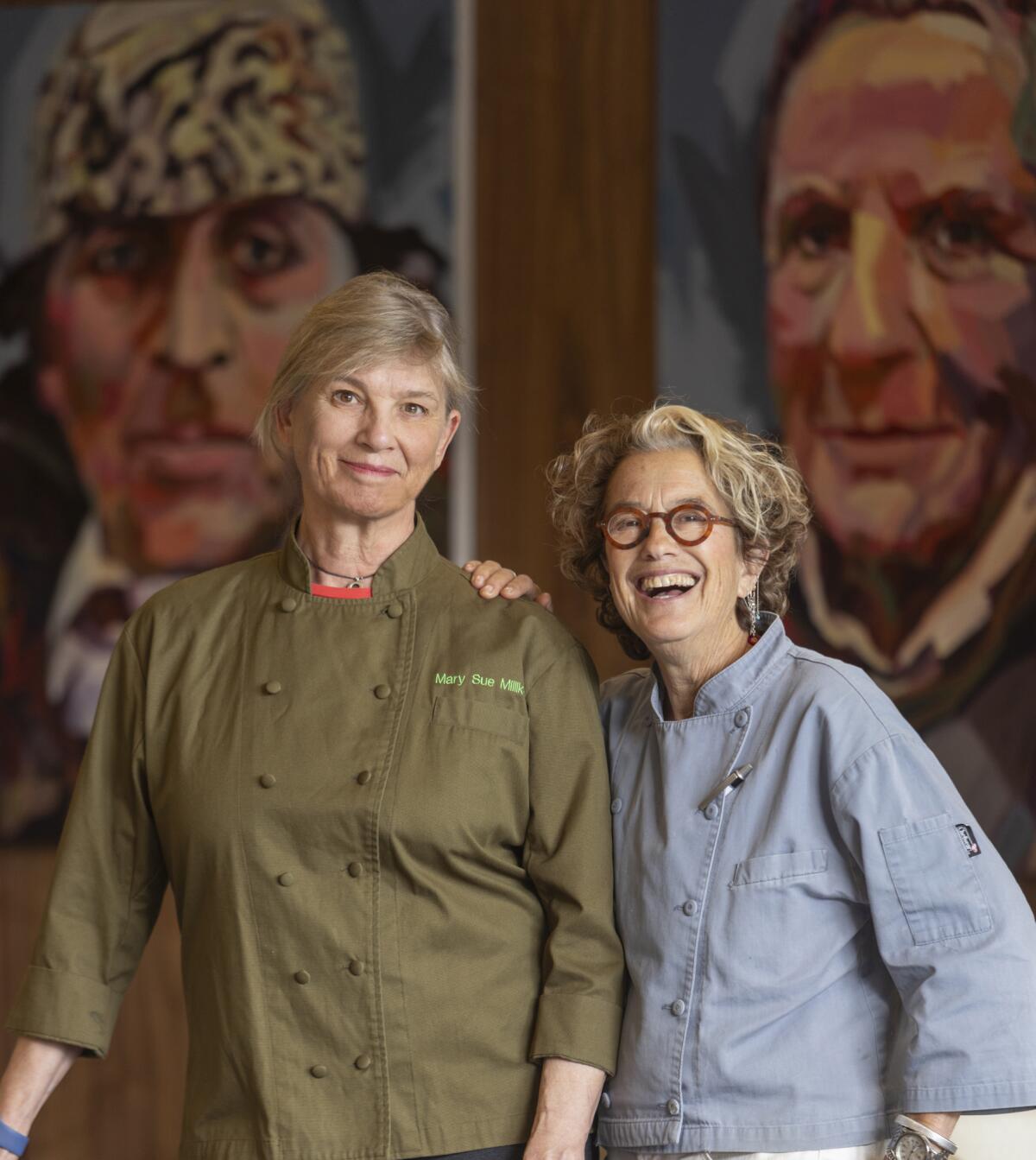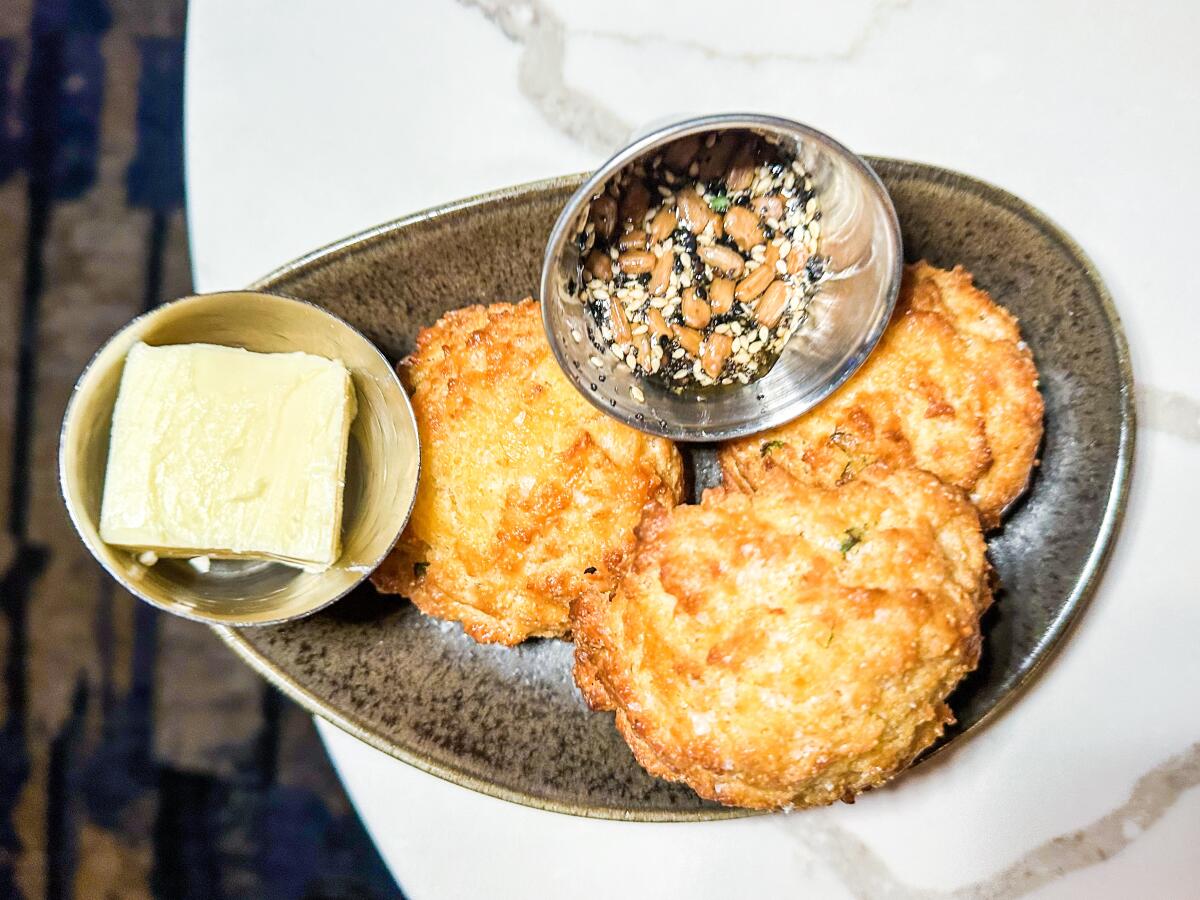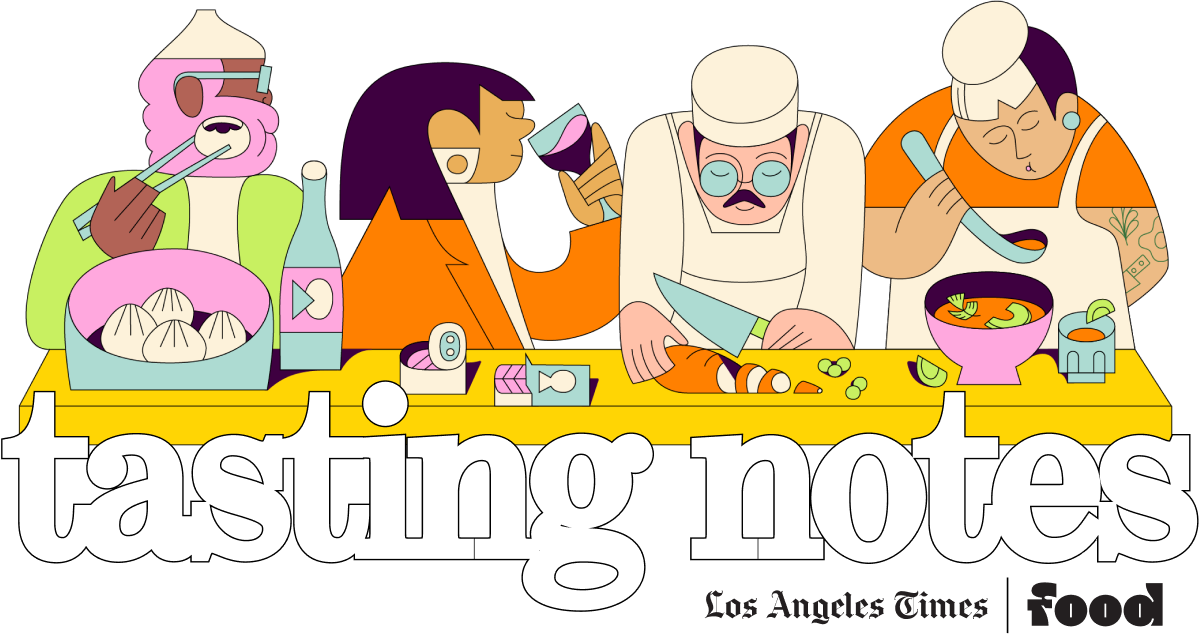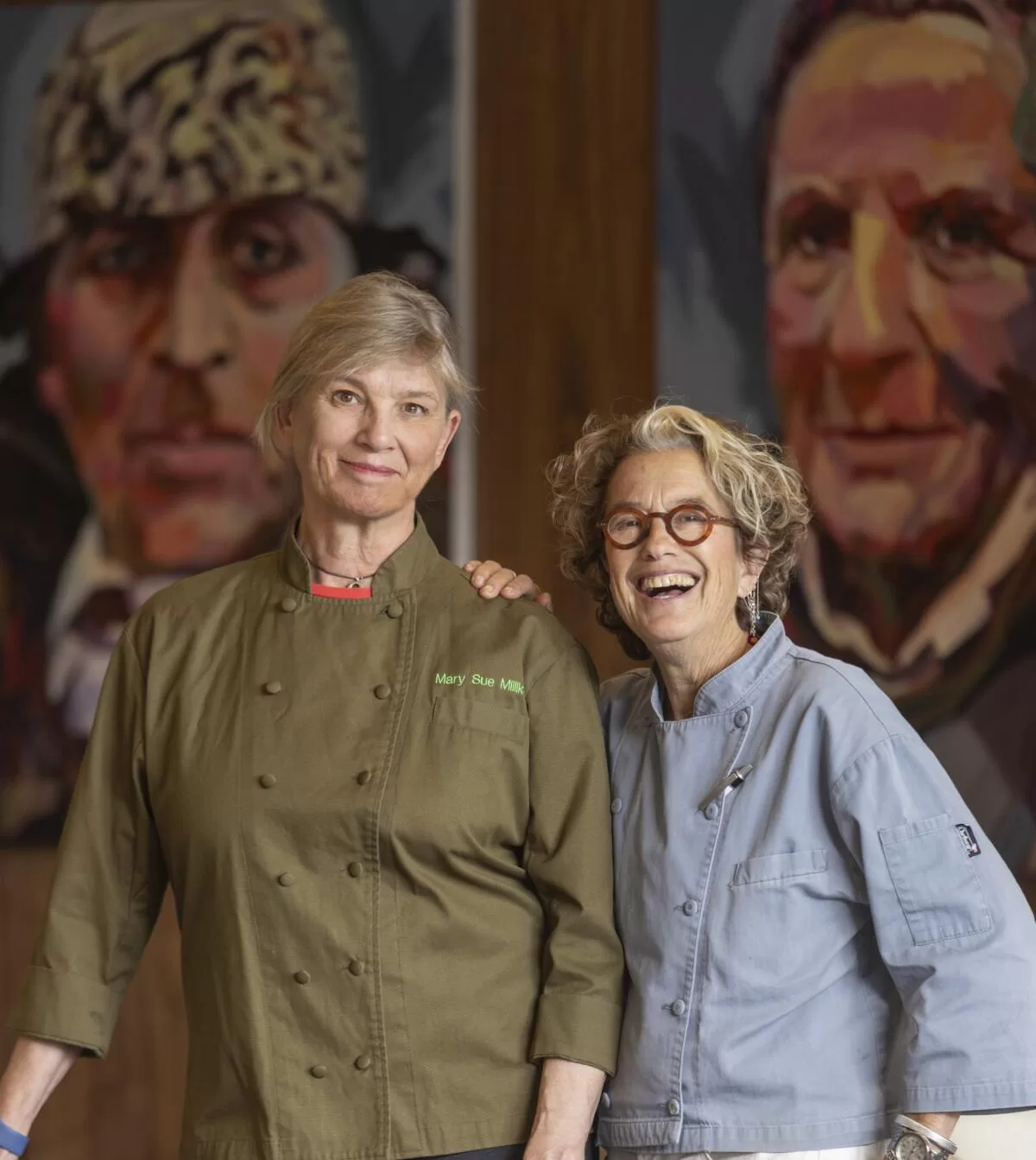Sometimes friends ask this when they’re thinking of inviting me and my partner over for dinner, and I’m quick to say that home-cooked meals are a rare pleasure; I always receive the food someone prepares and shares across their own table with plain gratitude. When I’m not eating on the clock, sure, I can power-down the critical brain enough to view food as fuel, to give my body a break with basic nutrition: oatmeal for breakfast, a salad for lunch.
But there’s an adjunct question that’s thornier to parse. It involves differentiating thoughts and emotions evoked by restaurant experiences that are so personal they don’t necessarily need to cross into my professional assessments.
Four-month-old Alice B. in Palm Springs is a place where my mind forks in two directions.
Two ‘Hot Tamales’ take Palm Springs
The project is the latest from Susan Feniger and Mary Sue Milliken. Their names are etched in the history of Los Angeles dining culture. Their first restaurant, City Cafe, opened in 1981, was a forerunner in global-minded menus. Four years later they embarked on the much larger City Restaurant and turned the cafe into their original Border Grill. Those of us watching the Food Network in its early years remember the pair as “Too Hot Tamales,” their show that ran from 1995 until 1999.

Chefs Mary Sue Milliken and Susan Feniger stand in the dining room of their new restaurant Alice B. in Palm Springs
(Anne Fishbein)
They launched their most recent Los Angeles-area restaurant, Socalo in Santa Monica, in 2019, surveying Mexican flavors in the forms of tacos, ceviches, grilled ribeye with nopales salad and brownie sundaes with Mexican chocolate sauce.
Alice B. is both a return and a departure. With executive chef Lance Velasquez, the menu circles back to Feniger and Milliken’s initial wide-world approach to cooking, specifically bridging retro Continental cuisine and Mediterranean influences with an emphasis on the California seasons.
What that means: plates of directly satisfying crudo, with heat from Fresno chiles and sweet-bitter limequat juice forming splotches in a pool of olive oil. California-grown asparagus, in its fleeting moment, dressed with goat cheese, nutty-sweet romesco sauce and salty Marcona almonds. Branzino over potato puree with celery root remoulade and olive-almond relish, and a seed-crusted chicken cutlet with a salad of apples and radishes that echoes the coating’s crunch and a slick of dill aioli for creamy contrast.
The Midcentury Modern charms of Palm Springs show up in a few winking, well-executed dishes like steak Diane, a throwback from the Continental playbook. Its cream sauce, spiked with brandy and Dijon mustard, under filet mignon takes me back to special-occasion outings in my Gen-X childhood. A balanced side of sugar snap peas lifted with lemon, green garlic and pine nuts returns me to the 2020s.
Velasquez had moved from the Bay Area to the desert in 2020 with the goal of opening a restaurant called Biscuit and Counter; you can taste traces of what might have been in his excellent starter of cornmeal-cheddar drop biscuits, served warm and crisp-soft with cardamom-infused honey.

A starter of cornmeal-cheddar drop biscuits at Alice B. in Palm Springs.
(Bill Addison / Los Angeles Times)
Early in its run, the food at Alice B. is consistent and forthright: If these descriptions generally appeal, I trust you’ll enjoy it. If the cooking here sounds too universal or retrained, I have two dozen other freshly considered recommendations in the Palm Springs area published this week by way of guidance.
I find myself returning as much for biscuits and grilled asparagus as for the reflections I fall into there.
Newsletter
You’re reading Tasting Notes
Our L.A. Times restaurant experts share insights and off-the-cuff takes on where they’re eating right now.
You may occasionally receive promotional content from the Los Angeles Times.
You probably guessed its name summons Alice B. Toklas, the 40-year companion of Gertrude Stein. The restaurant resides just inside the doors of Living Out, a new luxury apartment community geared toward 55-and-older LGBTQ residents. Even in Palm Springs, one of the gay epicenters of the known universe, it’s the first dedicated retirement community of its kind. Portraits of Toklas and Stein hang front and center of the dining room — offsetting, along with some mod globe-shaped lighting fixtures, a space with fundamentally generic hotel-lobby vibes.
It’s the customers who bring the spark of individuality to the atmosphere.
No one demographic defines the mix of people on any given evening, but the crowd certainly skews older. Cheeringly so, at least to me. I feel quiet joy watching groups of gay men five or 10 or 20 years my senior stroll through the doors, a little dressed up, their latest stylish shirts pulled out of their closets for a night out.
It’s a common enough sight in town — even as waves of younger tourists and residents feel the pull of Palm Springs in its sustained era of renewed coolness — but at Alice B. there’s an extra hint of intention to their presence. Beyond the aura of welcome that Living Out engenders, perhaps some of them show up to support Feniger, who is married to filmmaker Liz Lachman. (A documentary Lachman made called “Susan Feniger. Forked.” about the chef’s struggles to open a solo L.A. restaurant last decade has been making the film festival rounds.)
In a communal haven, letting the critic mind drop away, I can be present with ageless grief I barely ever give myself time to feel — to lives lost during the AIDS epidemic, to all the men who aren’t here, who should have still been among us.
I think of Richard Toma, my acting teacher at Emerson College in Boston. I would sit with him during his last year sometimes when his partner, Randy, also dying of AIDS, had doctors’ appointments. Richard started sinking into dementia. One afternoon he was certain that he was in California. I was 21 and didn’t know what else to do but go along with him. He talked about how much he liked it there, and specifically how good the ripe avocado tasted in sandwiches.
He died in August 1994, almost 30 years ago. He would be 78 if he had lived. Richard was rascally and urban. Maybe he would have hated the mainstreaming of Palm Springs. In his widely read intelligence, he may also have noted that Toklas outlived Stein by over 20 years and died destitute and largely snubbed. (A 2006 New Yorker piece on the couple by Janet Malcom is a potent read.)
“It’s true, it’s a romanticization,” I’d say to Richard over avocado toast at Alice B.’s brunch. I’d do my best to stumble through voicing the bigger symbolism, the two of them as enduring metaphors for live-out-loud queerness, for creative patronage, for until-death-do-us-part coupledom.
What would Richard retort to all that? I can only imagine so far. A restaurant is a restaurant is a restaurant. But sometimes it can be more.
Also …
And finally: Last chance for tickets to Great Australian Bite!
This week marks the upcoming dinner, an L.A. Times and Tourism Australia collaboration, featuring Australian chef Josh Niland. He’s known for “The Whole Fish Cookbook,” which was book of the year winner at the 2020 James Beard Awards, and runs Sydney’s Saint Peter restaurant and fish butchery, where he applies a nose-to-tail approach to fish and seafood. Those of us in Southern California will have a chance to experience Niland’s cooking April 10 on the Malibu Pier when he joins Melbourne chef Jo Barrett, who is the Age Good Food Guide’s 2024 chef of the year and known for her no-waste kitchen practices, along with L.A. chef (via Australia) Monty Koludrovic of the W Hollywood’s Living Room. Tickets are available here.
Newsletter
Eat your way across L.A.
Like what you’re reading? Sign up to get it in your inbox every week.
You may occasionally receive promotional content from the Los Angeles Times.

